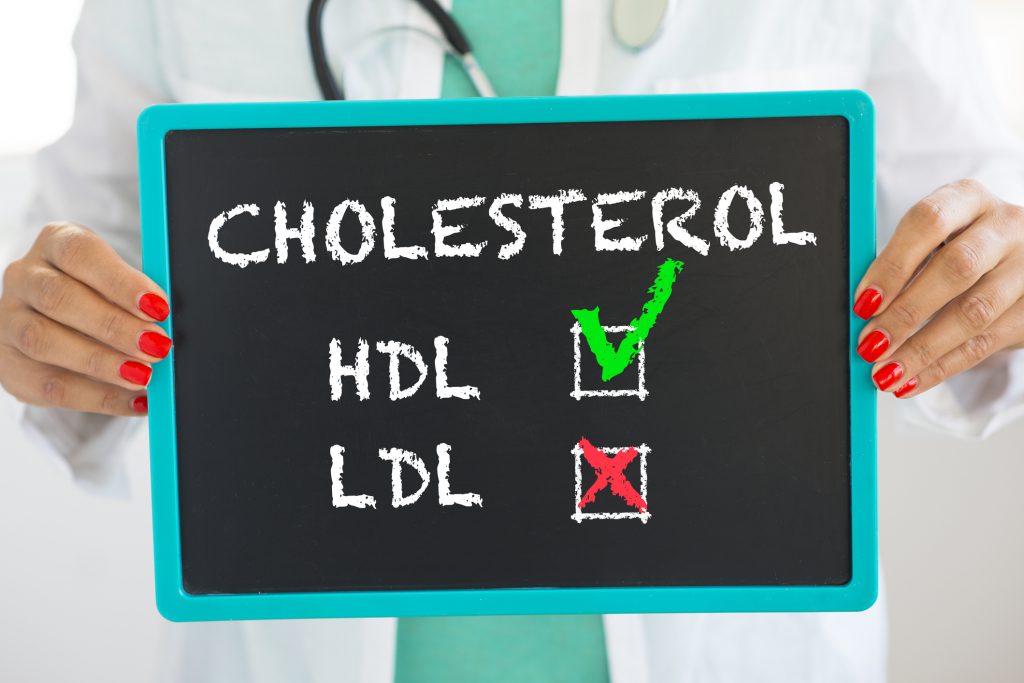Cholesterol is a necessary component of the cells in the body. It is found in large quantities in nerve tissue, the brain, skin, adrenal glands, and liver. Cholesterol is a soft, fat-like substance found in the bloodstream along with the circulating fats called lipids. Cholesterol is not able to dissolve in blood and in order to be transported it must be united with a type of

Low Density Lipoprotein (LDL) is known as bad cholesterol when found in large quantities. It contains more cholesterol than protein and helps transport cholesterol to the cells. When the LDL level is high, excess cholesterol will accumulate in the blood vessels and lead to complications.
High Density Lipoprotein (HDL) is known as good cholesterol because it contains more protein than other cholesterol. This form of lipoprotein helps transport excess cholesterol away from the cells, therefore, it is better to have more HDL’s and fewer LDL’s in the bloodstream.
When there is too much cholesterol circulating in the blood, it leads to a disease called hypercholesterolemia. This elevated level of cholesterol in the blood will eventually lead to the formation of fatty deposits of plaque on the lining of blood vessels. When this happens, blood vessels become narrowed and hardened by these deposits. This condition is called atherosclerosis and it can lead to the formation of blood clots in these now narrowed blood vessels. When blood vessels become narrowed, it makes it difficult for blood to reach parts of the body and can eventually cause serious damage. It is believed that atherosclerosis causes more deaths due to heart attacks than any other disease.
A diet high in cholesterol can lead to stroke, heart disease, atherosclerosis, and possibly death. Many of the great tasting foods that we eat every day contain high amounts of cholesterol. Foods that are high in cholesterol include red meat, egg yolks, whole milk, cheese, ice cream, butter, fried foods, cake, and cookies. Foods that are prepared with high amounts of saturated fats such as palm or coconut oil also lead to high cholesterol levels.
Foods that are low in cholesterol and high in fiber are a smarter choice. These include fresh leafy vegetables, peas, dried beans, and whole grains. A healthy diet is one that contains less red meat and more fish and poultry. Taking the skin off poultry makes it even healthier to eat.
Other factors that can lead to high cholesterol include smoking, obesity, and a family history of heart disease.
The American Heart Association says that when the level of cholesterol rises above 200 milligrams per deciliter of blood, there is a significant increase in the risk of having a heart attack. High cholesterol can vary from person to person but is generally defined as above 240 mg/dl.
The body has the ability to produce approximately 1,000 milligrams of cholesterol daily from the carbohydrates and fats that we eat. Therefore, it is not necessary to eat foods that are high in cholesterol in order to meet the body’s needs. In fact, the American Heart Association recommends that you limit your daily intake of cholesterol to no more than 300 milligrams per day. The daily diet should contain no more than 30% fat and only a third of this fat should be saturated.
Exercise and a healthy diet are two ways that you can lower your cholesterol. It is important to always consult a physician before starting any diet or exercise plan. Stress management is also very helpful in reducing the risk of heart disease, heart attack, and stroke. In many cases where cholesterol levels are not being controlled, it may be necessary for a physician to prescribe medication to help lower it.
All content of this newsletter is intended for general information purposes only and is not intended or implied to be a substitute for professional medical advice, diagnosis or treatment. Please consult a medical professional before adopting any of the suggestions on this page. You must never disregard professional medical advice or delay seeking medical treatment based upon any content of this newsletter. PROMPTLY CONSULT YOUR PHYSICIAN OR CALL 911 IF YOU BELIEVE YOU HAVE A MEDICAL EMERGENCY.
